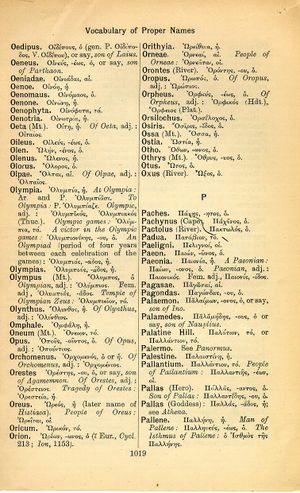Otho: Difference between revisions
ἐβόα καὶ βαρβαρικῶς καὶ Ἑλληνικῶς → shouted out both in Persian and Greek, shouted out in the barbarian tongue and in Greek
(D_6) |
(Gf-D_6) |
||
| Line 1: | Line 1: | ||
{{WoodhouseENELnames | {{WoodhouseENELnames | ||
|Text=[[File:woodhouse_1019.jpg|thumb|link= | |Text=[[File:woodhouse_1019.jpg|thumb | ||
|link={{filepath:woodhouse_1019.jpg}}]]Ὄθων, -ωνος, ὁ. | |||
}} | }} | ||
{{Lewis | {{Lewis | ||
| Line 6: | Line 7: | ||
}} | }} | ||
{{Gaffiot | {{Gaffiot | ||
|gf=<b>Ŏthō</b>,⁸ ōnis, m. (Ὄθων), surnom romain ; not<sup>t</sup> : L. [[Roscius]] Othon [tribun de la plèbe, qui fixa la place des chevaliers au théâtre] : Cic. Mur. 40 || M. [[Salvius]] Othon [qui détrôna [[Galba]] et fut vaincu par [[Vitellius]] : Mart. 6, 32, 2 ; Juv. 2, 99 || <b>-nĭānus</b>, a, um, d’Othon : Tac. H. 2, 24 || subst. m. pl., les soldats d’Othon : Tac. H. 1, 34. | |gf=<b>Ŏthō</b>,⁸ ōnis, m. (Ὄθων), surnom romain ; not<sup>t</sup> : L. [[Roscius]] Othon [tribun de la plèbe, qui fixa la place des chevaliers au théâtre] : Cic. Mur. 40 || M. [[Salvius]] Othon [qui détrôna [[Galba]] et fut vaincu par [[Vitellius]] : Mart. 6, 32, 2 ; Juv. 2, 99 || <b>-nĭānus</b>, a, um, d’Othon : Tac. H. 2, 24 || subst. m. pl., les soldats d’Othon : Tac. H. 1, 34.||M. [[Salvius]] Othon [qui détrôna [[Galba]] et fut vaincu par [[Vitellius]] : Mart. 6, 32, 2 ; Juv. 2, 99||<b>-nĭānus</b>, a, um, d’Othon : Tac. H. 2, 24||subst. m. pl., les soldats d’Othon : Tac. H. 1, 34. | ||
}} | }} | ||
Revision as of 07:33, 14 August 2017
English > Greek (Woodhouse)
Ὄθων, -ωνος, ὁ.
Latin > English (Lewis & Short)
Ŏtho: ōnis, m., = Ὄθων,
I a Roman surname.
I L. Roscius Otho, a knight, a friend of Cicero, and author of the law that the knights should occupy the first fourteen seats in the theatre next to the orchestra, Cic. Mur. 19, 40; cf. Ascon. ad Cornel. p. 79 Orell.—Hence, sic libitum vano, qui nos distinxit, Othoni, Juv. 3, 159.—
II M. Salvius Otho, a Roman emperor, whose biography is given by Suetonius: mollis Otho, Mart. 6, 32, 2; Juv. 2, 99.—Hence,
B Ŏthōnĭānus, a, um, adj., of or belonging to the emperor Otho, Othonian: Othoniani duces, of the emperor Otho, Tac. H. 2, 24: partes, id. ib. 2, 33.
Latin > French (Gaffiot 2016)
Ŏthō,⁸ ōnis, m. (Ὄθων), surnom romain ; nott : L. Roscius Othon [tribun de la plèbe, qui fixa la place des chevaliers au théâtre] : Cic. Mur. 40 || M. Salvius Othon [qui détrôna Galba et fut vaincu par Vitellius : Mart. 6, 32, 2 ; Juv. 2, 99 || -nĭānus, a, um, d’Othon : Tac. H. 2, 24 || subst. m. pl., les soldats d’Othon : Tac. H. 1, 34.

